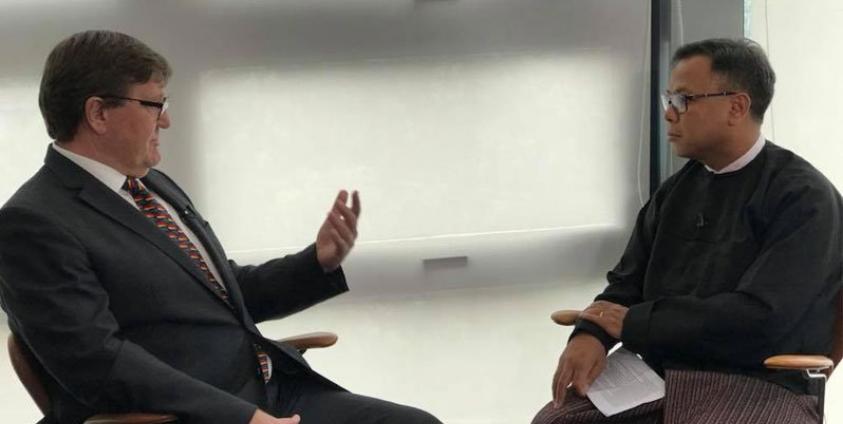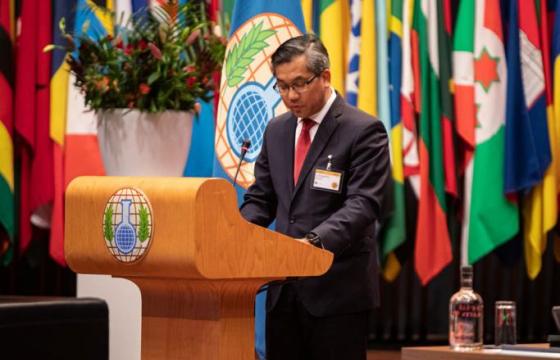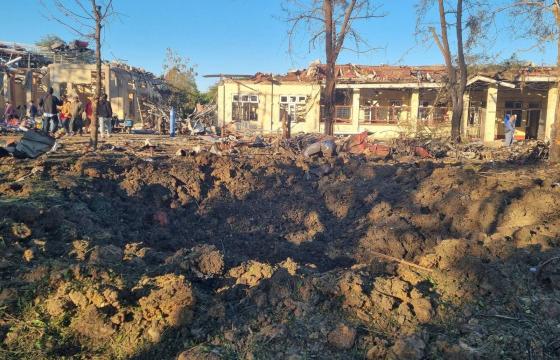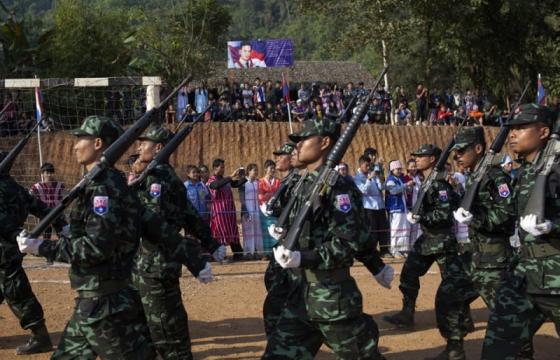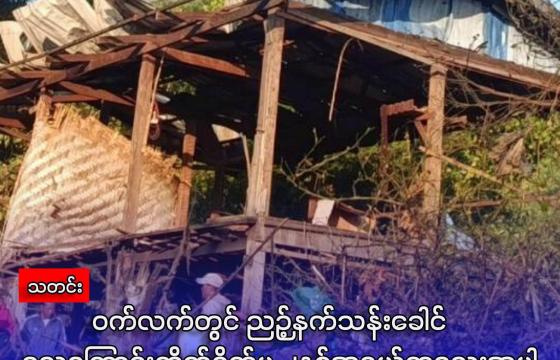In recognition of World Press Freedom Day the Danish Ambassador, Mr Peter Lysholt Hansen, shared his thoughts with Soe Myint, Editor-In-Chief and Managing Director of Mizzima Media Group in an exclusive interview for Mizzima TV.
Thank you Excellency for giving an interview to Mizzima TV. Allow me to start with press freedom. May 3 is World Press Freedom Day, and Denmark has shown a very strong interest in the need for press freedom in Myanmar with two Reuters journalists currently in jail, what is Denmark’s position on the case?
Well, I think what is important to say is that the case of the two Reuters journalists is in many ways a test of press freedom in Myanmar. The two journalists did what journalists are supposed to do, tried to find out the truth about what happened in a village in Rakhine. They have only done what journalists should do and that is to try to expose if atrocities were committed. Based on their investigation, the Tatmadaw initiated its own investigation and concluded that atrocities had taken place in Inn Din village in Maungdaw. One has to remember that the Tatmadaw had already established that it had done nothing wrong during its operations in northern Rakhine state.
Now it seems that the two journalists were set up. We heard testimony in court from a police captain that the two journalists had been set up. It is important that Myanmar accepts that freedom of the press is a basic part of any democracy. In our view there is no basis for this case, which is why we have consistently urged that the two journalists be released. It is a question of taking press freedom seriously and we hope that the authorities will make the right decisions. The two journalists have been in prison for more than four months. Denmark has attended almost all the court hearings and not seen any evidence that the two journalists did anything wrong.
You have seen the changes in Myanmar, the democratic transition, the democratic changes, even the changes in press freedom in the country in the last few years. How do you see the current status of overall media freedom?
Of course if you compare to the situation during military dictatorship, it has improved a lot, no doubt about that. But Myanmar is still not considered to have real freedom of the press and there is still a lot of work to do. Furthermore, press visits to Rakhine have been very limited, so while we have seen improvements, I think many of us hope that the government will see that it is in its own interest to have a free press that can report on things as they are. I think the people of Myanmar also deserve to know what is happening in their country and a free press is the best guarantee for this.
Taking into account Denmark’s own history of press freedom, how do you see the role of media, the role of media freedom in democratic transition, particularly in a country like Myanmar?
The media’s job is to expose abuse or misconduct by those in power so that it does not happen again. I think this is even more important in a country like Myanmar where you are transitioning from military dictatorship to democracy, including in order to make sure that the government, the civil service and the military all live up to your laws and regulations.
So do you raise this issue of the importance of media freedom in the democratic transition in your interactions, meetings and discussions with Myanmar authorities?
Of course, I have talked with the Myanmar government, authorities and civil society about many issues, including freedom of the press.
I would like to ask your opinion and views on Rakhine. Myanmar has been heavily criticized, particularly by Western countries on its handling of the issue. How do you see the way Myanmar handles the Rakhine crisis and what do we need to do more, what should we be doing to handle this situation, to handle the crisis better way?
Let me start by saying that the situation in Rakhine is very complex and it is not a situation that has arisen recently. The challenges in Rakhine have been there for many, many years and they cannot be solved overnight. Already back in 2015, we were some who urged the incoming NLD government to deal with Rakhine. The government then established the Advisory Commission on Rakhine State, headed by former UN Secretary-General Kofi Annan which we very much supported . It was a good way of trying to see how you could address the underlying challenges in a holistic way which would benefit all peoplein Rakhine and improve their lives. The commission came up with a number of recommendations, more than 80, and I think it is important for the government to implement all these recommendations in a holistic way. That would mean, for example ensuring the freedom of movement, access to education, and access to health for all people.
If people see that they can continue to earn a living, if they can see that there is a future for their children then they will also gradually come back and you will then gradually be able to develop Rakhine. But it is not an easy issue and it is important that the Muslim and Rakhine communities talk together and that the government talks with all parties. I have spent a lot of time in Rakhine during my almost four years in Myanmar, and I have made a point out of talking to all communities, because I think this is the only way forward. We need to have dialogue but also to make sure that everybody living in Rakhine have the opportunity to improve their standard of living, have their human rights respected and that they are allowed to go to the markets so that they can actually earn an income. So I think the government is doing things, but from my point of view, it is very important that it works to implement all the recommendations of the Rakhine Advisory Commission so it also addresses the root causes. It is not all about building housing or infrastructure, but about looking at how people can improve their lives.
When you talk with different communities particularly in Rakhine State how do see the thinking of the different communities. Are they ready? Are they willing to live together? Are they willing to work together to find solutions?
I think it depends very much on which village you are in. Before the attacks by ARSA which Denmark has very clearly condemned, there was I believe a general willingness among the different communities in Rakhine to talk together, to try to find a way of moving forward. However, the ARSA attack was a set-back. There were suddenly radicals from both sides with much stronger voices than they had had in the past. But there is no alternative to talking. If you want to find a solution you need to talk and you need to be open towards other people’s views and then try to find win-win situations. I think maybe the biggest challenge in Rakhine is that people see it as win or lose, that is if you win I lose. In Rakhine like everywhere else you can have win-win situations; you know if people’s lives are improved it will help Rakhine and Muslims and the other groups in Rakhine. I hope that this notion of creating win-win situations is something which the government will promote more.
In Myanmar historically, different communities have lived together, for example, Muslim business communities are very strong in many parts of the country. You will see Buddhist, Christians and Muslims living together in many parts of the country but in Rakhine, we have seen, in the last few years particularly, this divide between two particular communities. How do you see it?
Well, I think there are many reasons for division, but there is a lot of misinformation and a lot of rumours which are spreading very quickly in Rakhine- People end up getting scared which then results in more radical views taking firm hold. My point of view is that we should support all those who want dialogue and work actively to promote such a dialogue among communities in Rakhine. This dialogue is already taking place and I have participated in quite a few discussions with both Muslim and Rakhine community leaders. When you talk to them they seem ready to see how they can move forward together, but this of coursealso requires support from all sides; it requires that both communities have freedom of movement and equal access to education and health and if that is the case I am quite confident that things can improve in Rakhine.
I need to go into the issue of Denmark-Myanmar relations. What are the priorities of Denmark now in Myanmar?
We opened the embassy in 2014 and I am the first Danish ambassador to Myanmar. We are basically here because we want to support Myanmar’s transition to democracy. This is the main reason why we are here. Denmark is supporting the country’s development in quite a number of areas. We are supporting the peace process, the promotion of rule of law and human rights, basic education and economic development, the latter through support to coastal fisheries and to the promotion of small and medium-sized Myanmar companies. Recently, with the Myanmar Department of Forrestry we also approved a new programme on mangrove rehabilitation in Rakhine State. So this is what we are engaged in, all with a view to underpin and support the democratic transition which we think is so important. The people of Myanmar deserve to get democracy and to get the right to influence their own lives and be a part of the global community.
What about trade and investment, are there investments from Denmark coming to Myanmar?
There was quite a lot of interest when the transition started. We have Carlsberg here who has established a brewery in Bago. Maersk Line and phamaceutical company Nove Nordisk are also here, but of course the situation in Rakhine has had an impact on the interest from other Danish companies, there is no reason to hide that. Hopefully, the situation in Rakhine will improve and then we might see more interest from Danish companies. It is also in Myanmar’s interest to develop our bilateral trade and investment relations.
Why we have headlines every day or almost every day on Rakhine in the local media, international media, we also have conflicts in places like Kachin and Shan State. Myanmar has been trying its best to build peace, how do you view the current peace process in Myanmar?
The Myanmar peace process is very much a homegrown process which I think has many advantages, but as it is now, unfortunately, we see that confrontation between Tatmadaw and a number of ethnic armed groups is increasing and of course the victims of this are ordinary people. We see many people in IDP camps in Kachin and their lives are really difficult. There should be humanitarian access to all civilians who are suffering from conflict which they have not themselves been involved in. It is, however, also important that all parties show utmost restraint, but also will to compromise. In order to achieve peace everybody has to compromise and I think the basic philosophy is that you have to find a solution where everybody feels that their concerns are accommodated to a reasonable degree. Otherwise, you will not have a lasting peace.
Do you see the peace process progressing or regressing in terms of development in the last two to three years?
It is very difficult to say because if you look at the more formal elements, for the ethnic armed groups who signed the NCA things have improved, but if you look at what is happening on the ground in Kachin and in Shan States I do not think you can say it has improved, quite to the contrary. Let me put it this way, I would have liked to see much more progress and hopefully all parties will see an interest in a genuine peace in Myanmar. It will improve the lives of all those who are affected in these specific areas, but it will also improve the situation for Myanmar as a whole.
I would like to talk about development issues. One of the issues is agricultural and as you know Myanmar has been trying to improve in the agriculture sector for the first time in many years. What do you think of the agriculture sector and what has Denmark been doing and is there anything that Denmark has been involved in with a view to improving the agricultural sector in Myanmar?
There is in my view a huge potential in the agricultural sector because you have quite good climatic conditions in many areas in Myanmar, not least in Shan State, in Mon State, in Tanintharyi Region. Denmark is supporting the development of small and medium-sized companies as well as farmers. Only last month we approved projects worth 3.2 million US dollars to almost 100 different companies. Some of them are farmers that want to introduce drip systems for growing mangos; others want to install dryers based on solar power and again others want to introduce briquettes made of husk from rice and we are supporting them. The way we are doing it is we are providing a grant of up to 60 percent for any kind of improvement in energy efficiency, in water treatment, in food safety or occupational safety and health and then the companies have to fund the rest. I must admit I have been positively surprised at the interest and the commitment of the farmers. I went to Shan State last month myself and visited some of these farmers and there is really a will to develop. They want to sell their products not only in Myanmar but also in Thailand and China, so I think there really is a huge potential.
What other areas are there where Denmark has been supporting Myanmar in its transition to democracy?
We have been a major supporter to the development of the education system for the last six years. We were very involved in helping to develop the national education plan together with other donors; now we are supporting the ministry of education directly. We have established together with them a capacity development fund which they can use to increase the capacity of the ministry to implement reforms. We are also supporting education through the World Bank for stipends to students and training of teachers asl to monastic education and education in conflict affected areas. Quality education is so important for Myanamar’s development and we are very pleased with our collaboration with the Ministry of Education.
Denmark supported Myanmar’s democratic movement for many years and continued to support the democratic transition in the country. How do you see democratisation in Myanmar? What are the main challenges for democratic transition to succeed?
Well, democracy is not something that you can build overnight, it is something which takes quite a long time to develop because democracy is many things. It is Rule of Law, which means that everybody should be treated equally and they should have a right to a lawyer, if they are detained. That is one part of it, the other part of it is, of course, that people should have the right to speak out and to assemble freely, so there are so many things which have to be done. It is also necessary to adjust the laws to get rid of those laws which are completely outdated. You still have laws back from the colonial times which are actually being used in the case against the two Reuters journalists. It is a process, it will take time, but what is important is that it goes in the right direction.
Lastly, is there anything else you would like to tell the audience?
Yes. I would like to say that you have a fantastic youth. The young people of Myanmar have a lot of drive, they have a lot of ambition, and I think what is important is that we all support them because they are the future of Myanmar and they are the ones who can turn Myanmar into a full-fledged democracy. We are trying to see how we can best assist Myanmar’s youth and I hope that the young people will continue to demand that Myanmar develops into a fully democratic society.

